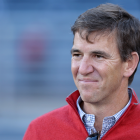Patriots part ways with Bill Belichick: How Belichick the GM cost the coach his job
Belichick had been New England's de facto GM throughout his tenure

FOXBOROUGH, Mass. -- It's a wild, but true statement -- Bill Belichick is no longer the head coach of the New England Patriots. The franchise has decided to mutually part ways with the legendary head coach, marking the end of a 24-year tenure largely headlined by a prolific run of success including all six of the franchise's Super Bowl titles. However, the sluggish final seasons of Belichick's tenure ultimately resulted in where the franchise finds itself today: without a head coach (and GM).
This decision comes after the worst season of Belichick's career as the Patriots went 4-13, which was the worst record in the AFC and found them in last place in the AFC East for the first time since 2000. Their regular season record, points per game (13.9), and total yards per game (276.2) were all the lowest for the franchise since 1992. It's the very definition of rock bottom to what has been a Lombardi standard in New England.
How did the Patriots and Belichick get here? What led to such a dramatic fall from grace?
While you can point to several things --- the departure of Tom Brady in 2020, the curious decision to hand the offense over to Matt Patricia and Joe Judge in 2022, etc. -- there's a very simple explanation to why the Patriots find themselves where they're at: They lack talent. High-end talent. That's on Belichick, who has been the team's de facto general manager throughout his tenure.
This is where, to steal a reference from Bill Parcells, allowing the coach to shop for the groceries went haywire, or at least it has in this case with the Patriots. Bill Belichick the GM has made life very difficult for Bill Belichick the coach, and ultimately cost him his job.
No matter what avenues the Patriots have gone down in recent years, they've tripped over themselves trying to bring in high-end talent. At the NFL Draft, the Patriots have been unable to identify foundational pieces, particularly on the offensive side of the ball. Wide receiver Tyquan Thornton, a second-rounder in 2022, has yet to make a major impact due to injury, and, of course, the team's first-round pick in 2019, N'Keal Harry, is considered arguably the biggest bust of Belichick's tenure.
Not only are the Patriots simply missing talent, but there also seemed to be something fundamentally wrong with the scouting process under Belichick. The team took Thornton over the likes of Pittsburgh's George Pickens, who just logged a thousand-yard season in his second year in the league while New England's leading receiver in 2023 (Demario Douglas) had 561 yards. In 2019, Harry was infamously picked over A.J. Brown and Deebo Samuel. Even in 2018, when they scouted the Georgia backfield, decided to take Sony Michel over his teammate, Nick Chubb.
And that's bled into free agency as well. As it relates to the 2023 Patriots, the way Belichick and the front office approached the offense line -- specifically the tackle positions -- was borderline NFL malpractice. The team bet on 34-year-old right tackle Riley Reiff, who played in just one game for the franchise this season. They also gave a raise to left tackle Trent Brown, who seemed to lack buy-in down the stretch and recently went scorched earth on the organization as well. Instead of aggressively pursuing and extending for younger and higher-upside talent, either via free agency or the NFL Draft, the Patriots went into the bargain bin with the offensive line and largely got bargain-bin results.
That poor blend of trying to find a bargain and the inability to scout skill positions was on display this offseason. Instead of extending Jakobi Meyers, a rare homegrown talent with a proven track record in the system, they let him walk and ink a three-year, $33 million contract ($21 million guaranteed) with the Raiders. New England then turned around and signed JuJu Smith-Schuster to a three-year, $25.5 million contract ($16 million guaranteed). Smith-Schuster finished the year with 260 receiving yards and one touchdown in 11 games played, while Meyers had 807 yards and eight touchdowns on 71 catches in 16 games played. Whether it was hoping that Smith-Schuster could be a talent upgrade over Meyers or whether or not they thought they could get the same production at a cheaper rate, the Patriots swung and missed.
Even when DeAndre Hopkins -- who finished with 1,057 receiving yards in 2023-- was available this summer and interested in joining New England, the team would not go the extra mile and contend with the two-year, $26 million contract ($10.9 million guaranteed) offer that he agreed to with the Titans.
These are just a few of the examples that turned into a mountain of trouble for Belichick and put Patriots owner Robert Kraft in the uncomfortable position of moving on from a franchise icon, which was ultimately the correct call.
This offseason, New England is armed with the No. 3 overall pick and the third-most available cap space in the NFL, which is strong springboard in trying to get the franchise back to a competitive state. While whoever stands behind Door No. 2 is still a question mark as to how they will perform, Belichick's recent GM résumé doesn't instill confidence that he would have be able to claw them back to relevancy, thus triggering this peaceful divorce.
In the end, it was Bill Belichick the GM that triggered the end of the greatest run that a head coach has ever experienced with a franchise.


















